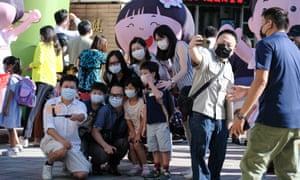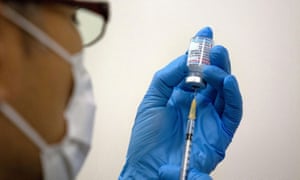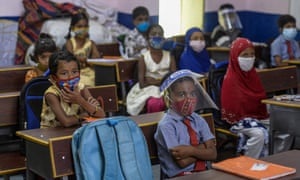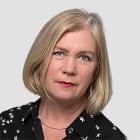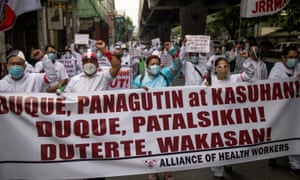
2.43am EDT02:43
Meanwhile, in the Australian state of New South Wales, pubs, restaurants, stadiums and services such as hairdressing could open to fully vaccinated people by mid-October, while vaccinated international travellers could be welcomed for Christmas under a system of home quarantine.
Premier Gladys Berejiklian said life will feel “very much more normal” by mid-October when the state is expected to achieve the 70% double-dose vaccination milestone, which would allow freedoms for vaccinated residents.
The state recorded 1,116 new Covid cases in the 24 hours to 8pm on Tuesday. Four women – one in her 50s, one in her 60s, one in her 70s and one in her 80s – died. They were all in hospital at the time.
Berejiklian said on Wednesday:
Whether it is attending a public event or having a drink, if you are fully vaccinated and the state has hit its 70% double dose target, please expect to do all of those things we have been missing for too long
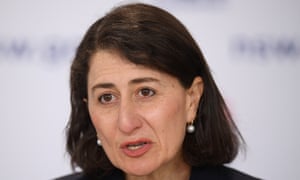
It follows Berejiklian’s earlier predication that October will be the most challenging period for the state’s hospital system.
Updated
at 3.11am EDT
2.37am EDT02:37
In Australia, the premier for Victoria has named September 23 as the date he believes 70% of eligible adults will have received their first vaccination dose and when restrictions can begin to lift.
But Daniel Andrews on Wednesday warned “we are in for a difficult time” and that case number’s wont’t come down despite the state having “thrown everything at this”.
He also announced that playgrounds would reopen from midnight on Thursday, but that was the only restriction that could ease as “things have changed very rapidly” with 120 new cases announced on Wednesday.
Of the new cases, only 20 were in isolation during their entire infectious period, Andrews said. He added:
These last few days have seen a dramatic shift in the nature and the number of cases coming forward.
From September 23, a number of restrictions will be eased in Victoria. The 5km travel limit in greater Melbourne will be extended to 10km for shopping and exercise; outdoor exercise will increase from two to three hours per day; outdoor communal gym equipment and skate parks will reopen; outdoor personal training will be allowed with up to two people plus a trainer; child-minding for school-aged children will be permitted; real estate private inspections of unoccupied premises for a new purchase or end of a lease will be permitted.
Construction sites will also be able to increase to 50% of their capacity if 90% of their workforce have received at least one vaccine dose. Term three of school will still be at home and the 9pm-5am curfew will remain in greater Melbourne.
Updated
at 2.44am EDT
1.58am EDT01:58
New Zealand records 75 cases after two days of falls
New Zealand has recorded 75 new cases of Covid-19, a bounce upward after two days of seeing cases decline.
The director general of health, Dr Ashley Bloomfield, said on Tuesday the increase was “not unexpected” and noted that during New Zealand’s previous outbreak, case numbers did move up and down somewhat day-to-day, while still tracking down overall.
Bloomfield said that the government’s modelling gave 90% certainty that the reproductive rate – or average number of new people that each case infected – was still below one, “indicating that the number of cases will continue to decline, and we are successfully breaking the chains of transmission”.
The total number of cases in the current outbreak is now at 687. Of these, one was in Wellington and the remainder in Auckland. Thirty-two people are hospitalised in Auckland, eight of whom are in intensive care, and three of whom are on ventilators. Contact tracers have identified 34,832 contacts in the outbreak so far:
Updated
at 2.38am EDT

